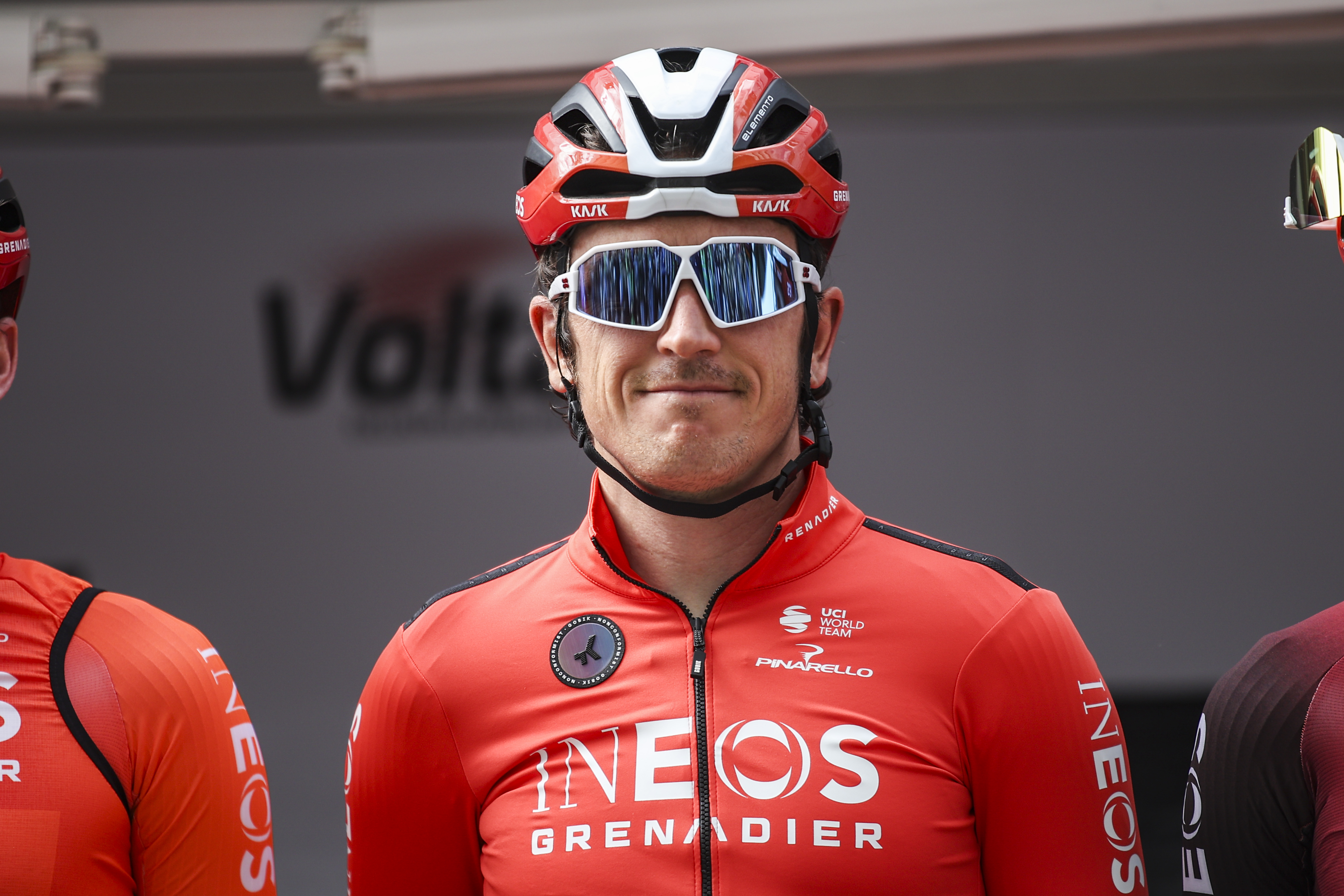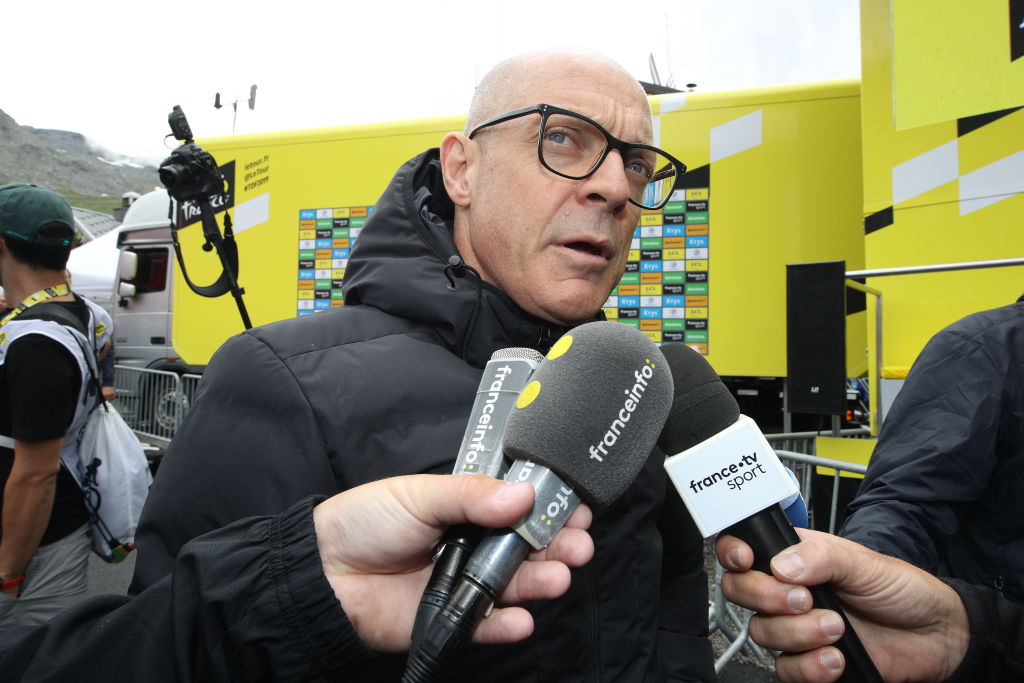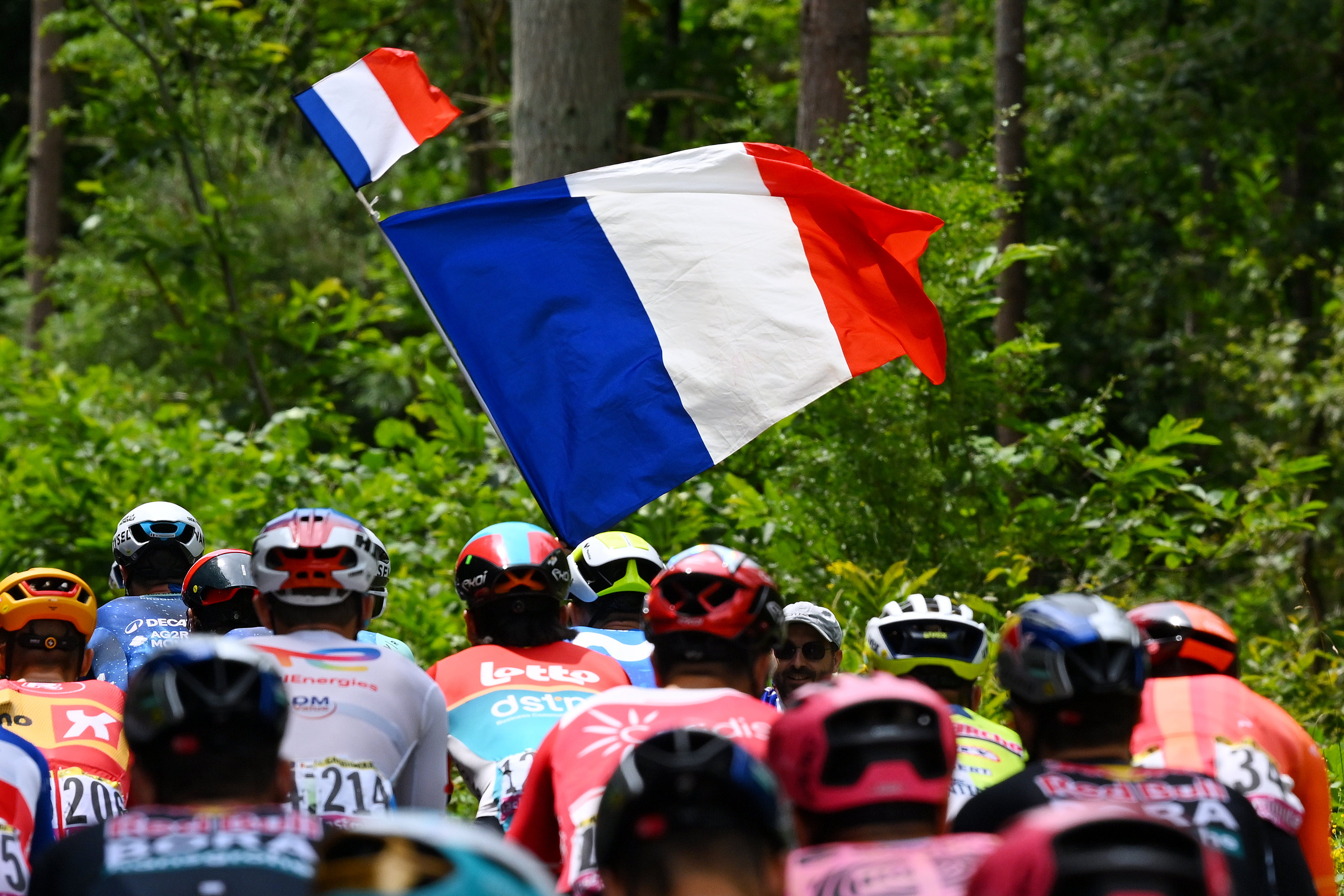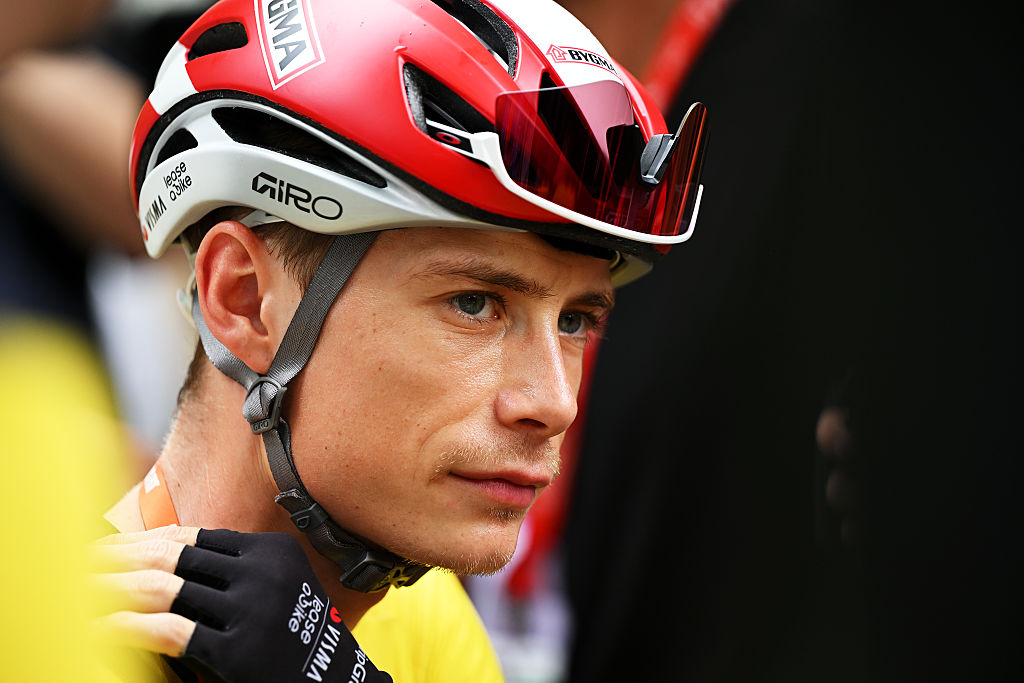The Tour de France's centenary celebration of the Alps
A Tour for the climbers
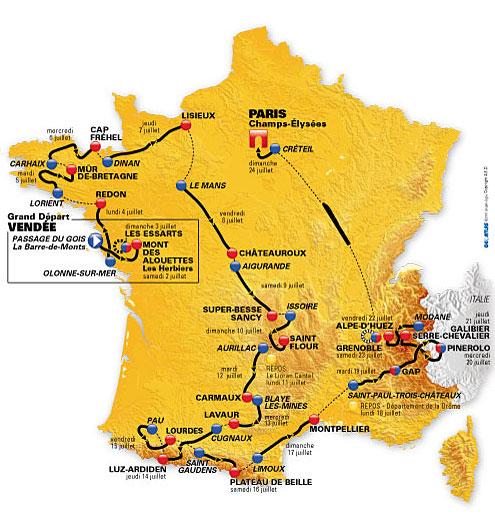
After a 2010 edition dedicated to the centenary of the Pyrenees, the 2011 Tour de France will celebrate the centenary of the first time the race climbed the Alps.
At the launch of next year's event in Paris, race director Christian Prudhomme unveiled a parcours ideal for climbers, with only 64 time trial kilometres of which 23 are a team time trial. Again, there will be no time bonuses on the road from the Vendée region to Paris, while a testing third week in the Alps sees the Tour return to the Galibier and L’Alpe d’Huez: two of its most legendary climbs.
A diverse start
The 2011 Tour's Grand Départ is in the windy Vendée region in Western France, on the Atlantic coastline. The first stage will see the peloton cross the famous Passage du Gois before the first uphill finish on the Mont des Alouettes in Les Herbiers, famous for organising the Chrono des Nations time trial.
The team time trial is back after a one-year absence, around the town Les Essarts, the home of Jean-Rene Bernadeau's team. The collective test against the clock has a totally flat profile and will certainly re-shuffle the general classification, even if the distance of 23 kilometres might not open up significant time gaps.
Stage three (Olonne-sur-Mer to Redon) will see the riders gear up for a probable bunch sprint as the Tour heads northwest from Vendée towards Brittany. On the next day, an uphill finish on the steep Mûr-de-Bretagne in central Brittany will suit the Classics riders and strong finishers, with the yellow jersey probably again up for grabs.
The Tour will then move northwards on stage five from Carhaix to Cap Fréhel, finishing on a windy and especially treacherous section of coast line. On the next day, the bunch will move over into Normandy for stage six from Dinan to Lisieux, the Tour’s longest stage with 226 kilometres.
Moving south: the medium mountains
After the first week in north-western France, the Tour route heads south into France's central mountain range via Châteauroux. The stage starts in Le Mans and is another sure bet for a bunch sprint. The first "real" uphill finish is scheduled for Saturday, July 8 in Super-Besse Sancy, followed by a perfect day for audacious escapists on the hilly stage nine from Issoire to Saint-Flour on Sunday July 10. Three Category 3 climbs await the riders, with the Puy Mary located more than 1500 metres above sea level.
The riders will be able to enjoy the first rest day on July 11 in Le Lioran in the Cantal cheese region. Two transitional stages will then pave the way south to the Pyrenees on July 12, with stage 10 from Aurillac to Carmaux and then stage 11 from Blaye-les-Mines to Lavaur. Many expected a first individual time trial at this point in the race but the 2011 Tour is set to feature even less time trialling than in 2010, with Prudhomme sticking to one race against the clock only as opposed to two in the past.
The Pyrenees: more than an appetizer
Three days in the Pyrenees with two mountain top finishes will provide plenty of climbing action in the second week and will reveal who has a real chance of victory before the Grande Finale in the Alps in the third week.
Stages 12 and 14 will end on top of Luz-Ardiden and the Plateau de Beille respectively, with the hard day from Pau to Lourdes surely to tempt the climbers to chase mountain points for the polka-dot jersey.
Stage 12 to Luz-Ardiden also has the famous Tourmalet on its profile, and stage 14 includes a total of four passes before the final ramps of the Plateau de Beille: Portet d’Aspet, Col de la Core, Latrape and Agnes.
After another transitional stage 15 from Limous to Montpellier, a day that should be marked green on the sprinter’s calendars, the race will head east across the south of France for the second rest day in the Drôme region on July 18 before the 2011 Tour reaches its climax in the Alps in the third week of racing.
A centenary in the Alps: the big showdown
The Tour De France climbed the Alps for the first time in 1911, with a 366km-long stage from Chamonix to Grenoble taking the riders over four testing passes: the Aravis, Télégraphe, Lautaret and Galibier.
100 years later, stage 16 from Saint-Paul-Trois-Châteaux to Gap serves as a taste of the pain to come and three days in the high mountains begin on July 20 as the peloton departs on a 179km-journey from Gap to Pinerolo in Italy. Three categorized climbs are on the menu: Col de Montgenèvre, Sestrières and the Côte de Pramartino.
Italy will be the only foreign country visited by the 2011 Tour. Riders will return to France on the next day for back to back mountain-top finishes. Stage 18 – the queen stage, no doubt - will finish on the prestigious Galibier (2645m), after crossing some of the most challenging climbs of the Alps: the Col d’Agnel (2774m) and the Izoard (2360m).
The Galibier will be re-visited on the next day via its northern side as the 109km-long 19th stage finishes with the climb to L’Alpe d’Huez. Although a short stage, it seems this one could be just as decisive as the 41km-long individual time trial that will follow on the race’s penultimate day in Grenoble.
No time bonuses, but secondary classifications changed
Again, Prudhomme has prefered a “real-time” general classification without any time bonuses. But the Tour organisers have altered the points systems in the hope of intensifying the fight for the green and polka-dot jerseys.
Prudhomme announced there one single intermediate sprint per stage, awarding half the points on offer at the stage finish. This way, the sprinters will have to sprint twice a day if they want to be a contender for the green jersey. The changes will surely change the pattern of the racing on most days and affect the chances of breakaways making it to the finish.
The mountains classification will also be changed, with double points up for grabs at the four mountain-top finishes of the race. This may be an additional lure for the strong climbers to show off their talent in the high mountains.
The 2011 Tour de France stages:
July 2, stage 1: Passage du Gois-Mont des Alouettes, 191km
July 3, stage 2: Les Essarts-Les Essarts, TTT, 23km
July 4, stage 3: Olonne-sur-Mer-Redon, 198km
July 5, stage 4: Lorient-Mûr-de-Bretagne, 172km
July 6, stage 5: Carhaix-Cap Fréhel, 158km
July 7, stage 6: Dinan-Lisieux, 226km
July 8, stage 7: Le Mans-Châteauroux, 215km
July 9, stage 8: Aigurande-Super Besse Sancy, 190km
July 10, stage 9: Issoire-St-Flour, 208km
July 11, rest day at Le Lioran/Cantal
July 12, stage 10: Aurillac-Carmaux, 161km
July 13, stage 11: Blaye-les-Mines-Lavaur, 168km
July 14, stage 12: Cugnaux-Luz Ardiden, 209km
July 15, stage 13: Pau-Lourdes, 156km
July 16, stage 14: Saint-Gaudens-Plateau de Beille, 168km
July 17, stage 15: Limous-Montpellier, 187km
July 18, rest day at province of Drôme
July 19, stage 16: Saint-Paul-Trois-Châteaux-Gap, 163km
July 20, stage 17: Gap-Pinerolo, 179km
July 21, stage 18: Pinerolo-Galibier/Serre-Chevalier, 189km
July 22, stage 19: Modane-Alpe d’Huez, 109km
July 23, stage 20: Grenoble-Grenoble, ITT, 41km
July 24, stage 21: Créteil-Paris/Champs-Elysées, 160km
The latest race content, interviews, features, reviews and expert buying guides, direct to your inbox!
Latest on Cyclingnews
-
'A stage win would be amazing' – 18 years since debut, Geraint Thomas eyes final Tour de France hurrah before retirement
Fully recovered from Tour de Suisse crash, Welshman excited as ever for 14th and 'one last big lap' of France -
'Not-so-secret weapon' Dave Brailsford returns to Ineos Grenadiers as they work to regain Tour de France dominance with TotalEnergies as new sponsor
'I'd like to think that in ten years' time you can see this era as a pivot point to a new chapter of success' says team manager John Allert -
The shadow tour? Inside the Coupe de France, French cycling's second-biggest multi-day competition
The Tour de France may be the pinnacle, but this lower-level series offers important racing for French teams, the chance for young riders to shine, and all-important UCI points -
'I think he'll be better than ever' – Jonas Vingegaard anticipates an even stronger version of Tadej Pogačar at the Tour de France
Dane says 'I feel like I'm improving in every aspect' ahead of another duel with yellow jersey rival
